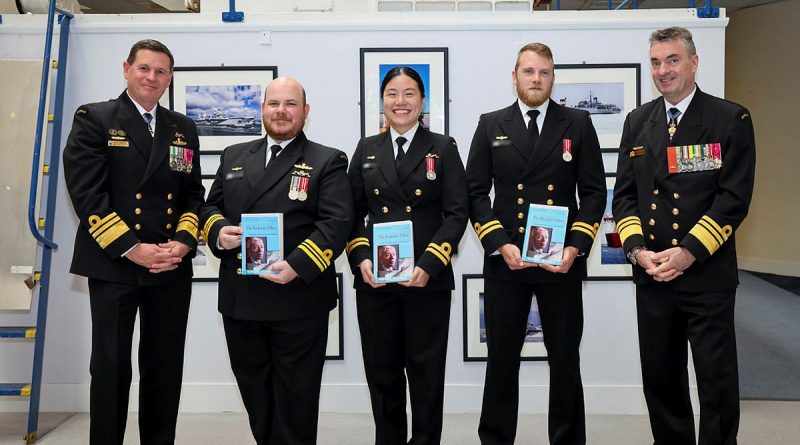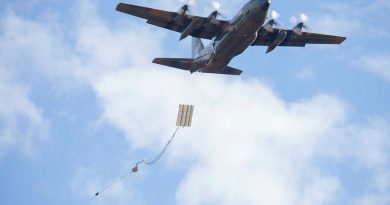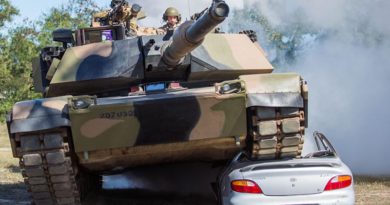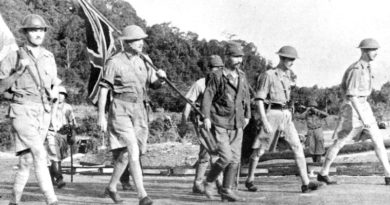Nuclear-powered sub training on track

AUKUS has taken another significant step forward with the graduation of three Royal Australian Navy officers from the Royal Navy’s (RN) Nuclear Reactor Course in Portsmouth UK.
CAPTION: Chief of Navy Vice Admiral Mark Hammond (far left) and the Director General of the Australian Submarine Agency, Vice Admiral Jonathan Mead (far right), with Australia’s first Navy officers to graduate from the Royal Navy’s Nuclear Reactor Course. Story by Lieutenant Commander John Thompson. Photos by LPhot Edward Jones.
Lieutenant Commander James, Lieutenant Stephen and Lieutenant Isabella have completed the intensive nine-month course alongside 14 RN officers, described as one of the Royal Navy’s most demanding courses. All three Australians finished among the top of the class, with Lieutenant Isabella coming first.
“It was an excellent course that really stretched me but made much easier being surrounded by a great bunch of fellow students. I particularly appreciated being able to apply our learning on the simulators to better understand how nuclear-powered submarines work,” she said.
“I was a weapons engineer, but nuclear engineering is a completely different ball park. I wanted a challenge, something interesting. It’s been fascinating and much more interesting than conventional engineering,” Lieutenant Stephen said.
Lieutenant Commander James is an experienced submarine and marine engineer.
“I was doing staff work, so when the advert went out for nuclear engineers, I volunteered – I wanted to keep myself busy and active. And it’s been very worthwhile.”
Chief of Navy Vice Admiral Mark Hammond and the Director General of the Australian Submarine Agency, Vice Admiral Jonathan Mead, were both on hand for the graduation.
Vice Admiral Hammond praised the “exceptional dedication” of the trailblazing trio for their success, and the Royal Navy for the “world-class training” it has provided.
“I am incredibly proud of all three of our remarkable officers for their achievements. Lieutenant Commander James, Lieutenant Stephen and Lieutenant Isabella have demonstrated exceptional dedication and effort to reach this milestone.
“Their achievements demonstrate the outstanding skillset and knowledge of our people undertaking this unique training from the Royal Navy – a long-standing partner and friend to the Royal Australian Navy,” Vice Admiral Hammond said.
Vice Admiral Mead says the graduation marks a significant milestone in the development of Australia’s nuclear-powered submarine program.
“The incredible training opportunities we are accessing through our AUKUS partners, including here in the UK, will ensure we can safely operate and maintain our sovereign fleet of nuclear-powered submarines.
“We are grateful for the support of the Royal Navy and their commitment to help us build a highly skilled and capable submarine workforce,” Vice Admiral Mead said.
The graduation ceremony marked the end of the shore-based requirements for the newly trained Australian nuclear-trained submariners.
They underwent six months of academic learning to understand how a nuclear reactor works and how to control it, covering diverse, complex subjects including nuclear physics, metallurgy, advanced mathematics, thermodynamics and nuclear safety management.
That was followed by three months of practice, learning the inner workings of nuclear systems and control room simulators to correctly respond to possible incidents and emergencies.
The three will now begin practical training, deploying alongside Royal Navy sailors, in the UK Astute-class submarines based at His Majesty’s Naval Base Clyde in Faslane, Scotland. When they return to Australia they will form a core of nuclear submarine engineers helping to develop Australia’s new capability.
They will be followed by more Australian submarine engineers who will go through the same program at HMS Sultan. As part of the AUKUS arrangements with the United States, 20 engineers are currently undergoing similar training with the US Navy.
.
.

.
.





